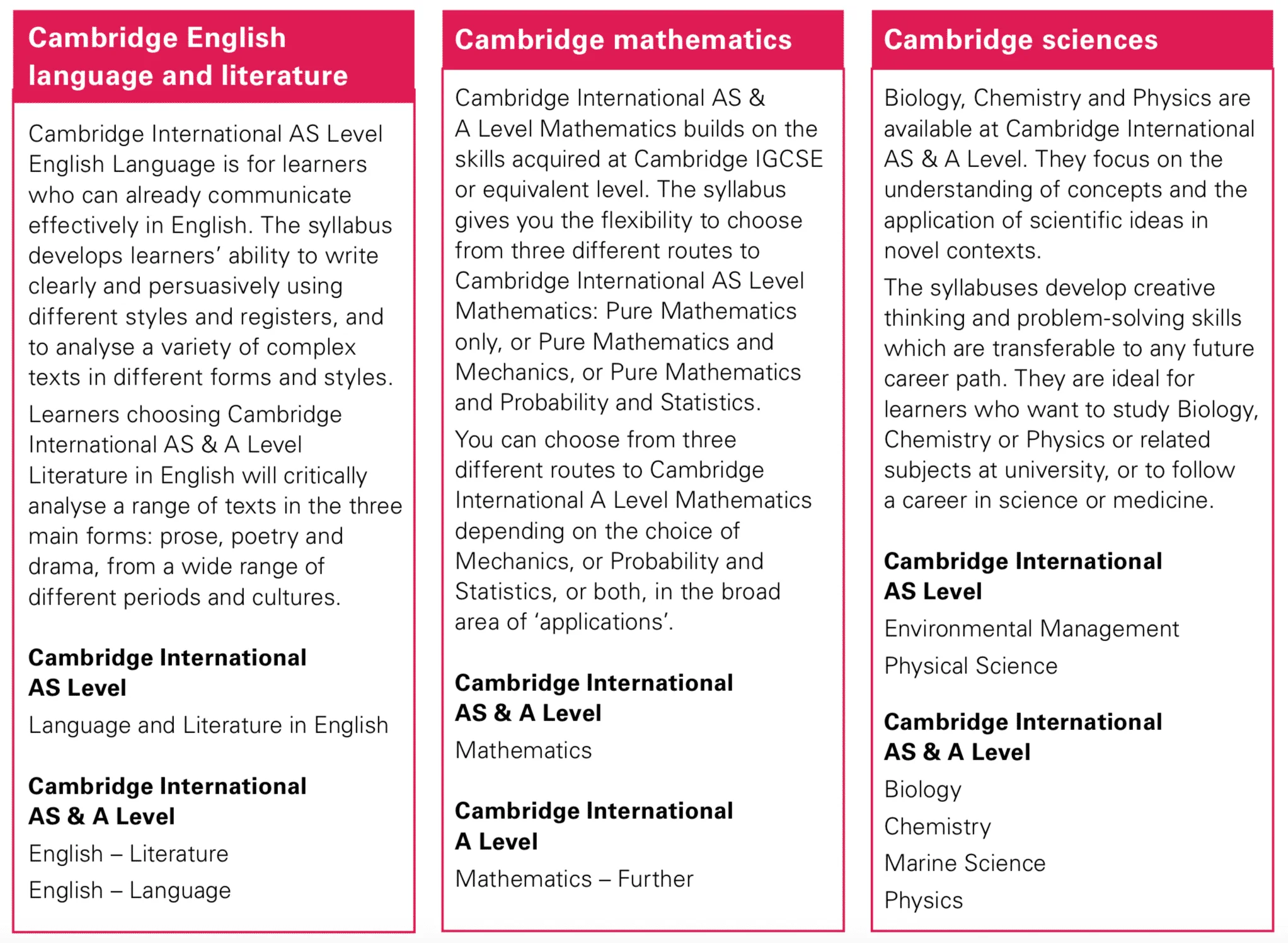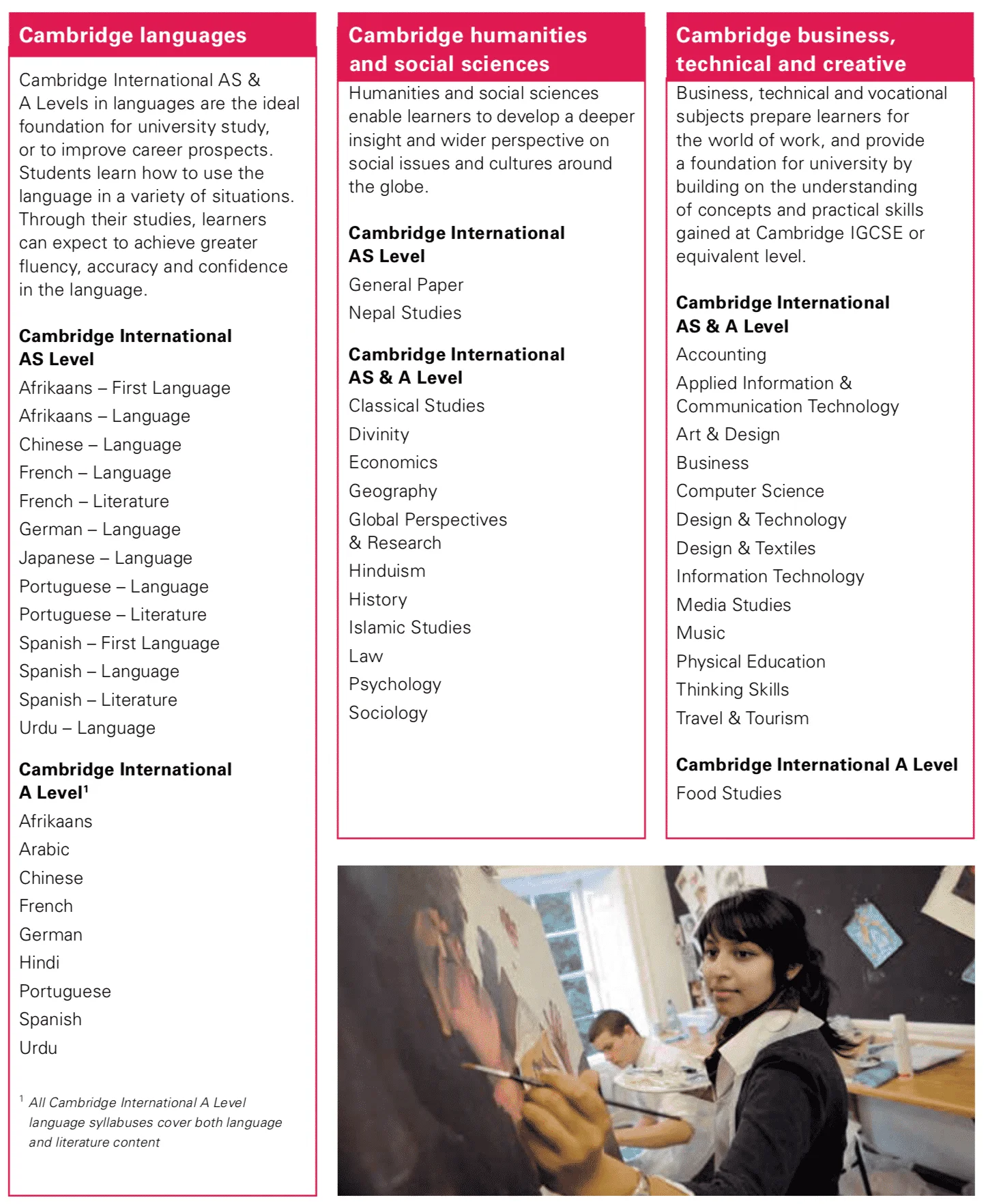
IGCSE English as a Second Language: Listening, Writing, and Speaking
Preparing for your IGCSE English as a Second Language (ESL) exam can feel daunting. You are not just learning grammar

Announcement: Cambridge IGCSE, O Level and AS & A Level June 2025 past papers are now available.
Announcement:
Cambridge International Education no longer be an Ofqual-recognised awarding organisation from December 20, 2024.
Thousands of learners use Cambridge International AS & A Level every year to gain places at leading universities worldwide. Students develop a deep understanding of subjects, as well as independent learning and constructive thinking skills - abilities which universities value highly.
Cambridge International A Level is typically a two-year course, and Cambridge International AS Level is typically one year.
Learners have the freedom to take Cambridge International AS Levels as qualifications in their own right, or as part of a progression to Cambridge International A Level. Learners can study for AS Level alongside A Level subjects to increase breadth in the curriculum and to build further knowledge and understanding.
The curricula are flexible. Learners can take almost any combination of 55 subjects. Learners can specialise or study a range of subjects, ensuring breadth.
Below are the Subject Groups for 55 subjects:


Learners use Cambridge International AS & A Levels to gain places at leading universities worldwide including in the UK, Ireland, USA, Canada, Australia, New Zealand, India, Singapore, Egypt, Jordan, South Africa, the Netherlands, Germany and Spain.
Cambridge International AS & A Levels are viewed as equivalent to the AS and A Levels taken by learners in the UK, and are accepted for entrance to all UK universities.
In places such as the United States and Canada, good grades in carefully chosen Cambridge International A Level subjects can result in up to one year of university course credit.
Over 500 US universities accept Cambridge International AS & A Levels, including all Ivy League and Ivy Plus universities. These universities include Brown, Harvard, MIT, Stanford and Yale.
Research carried out* looked at whether Cambridge International AS & A Levels prepared learners for continued studies in colleges and universities in the US, as well as Advanced Placement or International Baccalaureate programmes. The findings suggest that Cambridge quali cations compare favourably with the other programmes.
<* Published in the Journal of College Admission (Number 213, Fall 2011)>
Learners receive a separate grade for each subject that he/she takes.
Cambridge International A Levels are graded from A* – E. Candidates who do not obtain enough marks for an E grade at A Level may be awarded a compensatory AS Level.
Cambridge International AS Levels are graded from a to e. Candidates who do not obtain enough marks for grade e at AS Level will be ungraded.
The Cambridge AICE Diploma is a group certificate which requires learners to study subjects drawn from three curriculum areas within AS and A Level: mathematics and science, languages, and arts and humanities.
Learners can choose from a range of assessment options:
Option one
Take the AS Level only. The AS Level syllabus content is half a Cambridge International A Level.
Option two**
Take a ‘staged assessment route’ – take the AS Level in one examination series and complete the final A Level in a subsequent series.
(** The staged assessment route is not possible in all subjects. The outcomes awarded for Cambridge International AS Level language syllabuses cannot be carried forward to Cambridge International A Level.)
Option three
Take all papers of the Cambridge International A Level course in the same examination series, usually at the end of the course.
Our valuable A* resources had produced thousands of A* scorers around the world. Check them out below.
Our internationally loved exam model answers had helped thousands of students in scoring A/A*. Schools and teachers worldwide have used these resources to aid in their teachings. Learn what an A* answer like, copy the style and score A* in your exam.
Our word-renowned IGCSE and AS/A Level courses had produced more than 1100 A/A* scorers worldwide. They are suitable for schooled or home-schooled candidates, and as full course or revision course.
We have the most complete past exam papers library on earth (no kidding!). Choose your exam board and download everything with one click.
Get the latest exam syllabus and plan your study accordingly.
Find out the exam registration and results released key dates for IGCSE and AS/A Level.
Check your administrative zone, the exam dates and time. For both IGCSE and AS/A Level.
Find and locate the nearest exam centre for your location.
Please kindly read the AS & A Level FAQs here.
Note: CIE (Cambridge International Examination board) has its name changed to CAIE (Cambridge Assessment International Education) since October 2017.
In October 2023, CAIE updated its name, logo, look, and messaging. Cambridge International Education is the new name of the awarding body of Cambridge University Press & Assessment. This name will be used on materials related to administering exams and awarding qualifications.
Note: All relevant info taken from CIE.
Join 62,169 (and counting) IGCSE & AS/A Level subscribers who've taken our insanely valuable FREE email courses. Learn exam tips & score A* in your exam!
Join 62,169 (and counting) IGCSE & AS/A Level subscribers who’ve taken our insanely valuable FREE email courses. Learn exam tips & score A* in your exam!
Kher
Kher
Auret Murima
Auret Murima
Simi P
Simi P
Nihar Narsana
Nihar Narsana
Harsha
India
Harsha
India
Ethan
Ethan
sd
sd
Isa Jehanzeb
United Kingdom
Isa Jehanzeb
United Kingdom
Roro
Roro
Akshaya S T
Singapore
Akshaya S T
Singapore

Preparing for your IGCSE English as a Second Language (ESL) exam can feel daunting. You are not just learning grammar

Choosing the right educational pathway for your child is one of the most significant decisions a family can make. In

The IGCSE English First Language exam places a strong emphasis on creative writing, with writing descriptive and narrative essays being

In the IGCSE English First Language Directed Writing task, you’ll be required to either write a speech, letter, or article
86 responses
Hi ,I’m studying in an igcse school in India and I’m now in grade 9 . I’ve been told that grade 9 and 10 are a single course. We also have subject selection . Is this AS level or not.
Thanks
Hi Rishitha,
Students enter Advance Level (A Level) after completing O-Level or IGCSE Level.
Hello, I’m a private candidate who will be taking the Mathematics, Biology and and Chemistry A levels this June. I would like to clarify if graphing calculator TI-84 Plus C Silver Edition can be used in examinations under these subjects? Thanks!
Hi Mindy!
Please read this article to understand better on what is allowed and what is not: https://www.skolatis.com/what-kind-of-calculator-is-acceptable-for-use-in-cambridge-igcse-mathematics-examinations/
For the final confirmation, get confirmation from your Examination Officer from your school or exam centre for permitted model. They are the ones who have the final say on what is permitted.
Is it possible to finish AS & A level Mathematics in my AS year and take A-level Further Mathematics in my A-level year?
Hi Ali,
AS level is the first part of an A level course. A2 exams and coursework are added on to an AS level, bringing it up to A level standard. AS level results can be used to count towards your final A level result if you are proceeding to A Level.
As such you cannot take AS & A level Mathematics in the same examination series. You need to complete the AS level and A2 exams first before you take its A level counterpart. Consequently, you have to take AS level Further Mathematics before you can take A level Further Mathematics.
Alternatively, you can start studying Further Mathematics during your AS Level year, while you sit for the Mathematics exam, then sit for the Further Mathematics exam in the following year.
Are there any entry requirements to the A-level? Shall we pass the IGCSE before it?
Thank you for valuable information
Hello Wiame,
Students enter Advance Level (A Level) after completing O-Level or IGCSE Level.
Helloo
I have combined science, english and mathematics at O-level in Zimbabwe .which combination is best for me @ IGCSE A-level
Hello,
That depends on what do you want to study at A Level.